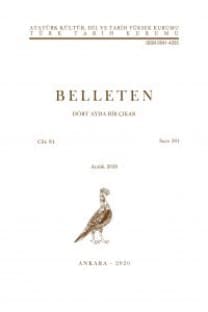SUGAR, PETER F.: Southeastern Europe under Ottoman Rule. Seattle, Londra, University of Washington Press, 1977. XVII -F 365 s. A IV 1982 [Kitap Tanıtımı]
Bu kitap, Washington Üniversitesi'nce yayımlanan onbir ciltlik bir dizinin beşinci cildini oluşturmaktadır. Dizinin kapsamına giren ve "Doğu Orta Avrupa" diye adlandırılan bölgenin sınırları, batıda Almanca ve İtalyanca konuşan halkların dilsel sınırları, doğuda ise Rusya - Sovyet Sosyalist Cumhuriyetler Birliği'nin siyasal sınırlarıdır. Bölgeyi bir bütün olarak ele alan bugüne değin yayımlanmış ilk geniş kapsamlı ve sistematik incelemeyi oluşturan dizide sırasıyla şu kitaplar yer almaktadır: Doğu Orta Avrupa'da Tarih Başlangıcı (Marija Gimbutas); Ortaçağda (400-1453) Bizans ve Balkanlar (Speros Vryonis, Jr.); ileri Ortaçağda Kuzeydoğu Orta Avrupa, 1000-1530 (Imre Boba); Lituanya ve Polonya - Lituanya Uluslar Topluluğu, 1000-1795 (Andrzej Kaminski); Osmanlı Yönetiminde Güneydoğu Avrupa, 1354-1804 (Peter F. Sugar); Doğu Habsburg Topraklarında Yaşayan Halklar, 1526-1918 (Robert A. Kanlı ve Zdenek David); Bölünen Polonya Toprakları, 1795-1918 (Piotr S. Wandycz); Balkan Ulusal Devletlerinin Kuruluşu, 1801-1919 (Charles Jelavich ve Barbara Jelavich) ; 1939'dan Bu Yana Doğu Orta Avrupa (Wayne S. Vucinich ve Lucien Karchmar) ; Tarihsel Atlas, Genel indeks ve Bibliyografya.
Beginnings of Leadership. Mustafa Kemal's First Visit to Libya, 1908
Mustafa Kemal's role during the Turkish - Italian war (1911-12) is well known; He was the commander of the front near Derna, in 'Ain al - Mansur. Enver Bey, who was the commander of the whole of Cyrenaica, stayed at the same camp. In the Presidential Archives in Ankara there are documents written by Mustafa Kemal during the war. In addition, there appeared contemporary journalistic descriptions and photographs of the Derna front. Later on, quite a few people described Mustafa Kemal's role there and his confrontations with Enver Bey. The area and its problems were not new to him. Mustafa Kemal's first visit to Libya was a short one and had more than a military aspect. He was sent there by the Committee of Union and Progress (CUP) at the end of September 1908, to investigate the reasons for political and military insubordination in Libya and was ordered to strengthen the Young Turks' status there. The descriptions of this visit are based to a great extent on Mustafa Kemal's memoires as published posthumously. Contemporary documents shed new light on his mission. Their authors were impressed by the character of this, to them yet unknown, young officer: they were aware of some of his virtues and realized the great future in store of him.
